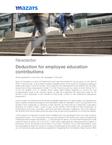
Deduction for employee education contributions
Some of the pillars on which the National Government based itself for the issuance of Law 1943 of 2018 -Financing Law-, was to obtain greater competitiveness for the country's companies, seeking a gradual decrease in their tax burden. Such objective was developed through different tax benefits, among them, those introduced by Article 77 of the Financing Law, by means of which Article 107-2 of the Tax Statute (E.T.) is created, which allows legal entities taxpayers of income tax and complementary taxes of the ordinary regime, to take as a deduction the payments made for the benefit of their employees or the members of the family nucleus of this, destined to educational programs[1].
In this context, the following will be fiscally acceptable deductions for legal entities: (a) Payments for total or partial scholarship programs and forgivable credits for education, which are granted for the benefit of their employees or members of their families; (b) Payments for investments in education programs for children under 7 years of age, for the benefit of the children of their employees; (c) Contributions to primary, secondary, technical and higher education institutions, which are made for the benefit of the communities where the legal entity carries out its productive or commercial activity.
In this regard, it is important to quote what is established in the paragraph of the rule under analysis, according to which: "For all purposes, the payments defined in this article shall not be considered as indirect payments made to the worker (...)". According to the above, it is clear that the payments made under the terms of article 107-2 of the E.T., shall not be understood as indirect payments made to a third party, but for the benefit of the worker or his family. Therefore, from a first interpretation it can be concluded that these will not be an income to be declared by the worker and, consequently, they are not framed as salary payments susceptible of integrating their Contribution Base Income (IBC) for making contributions to the Social Security System, nor will they be considered as non-wage payments that must be taken into account within the 40% limit provided in Law 1393 of 2010.
In any case, it is especially important to mention that, for the application of the provisions described above, the draft decree regulating the provisions contained in article 107-2 of the E.T. created by the Financing Law is currently published on the website of the Ministry of Finance and Public Credit. This project defines the concepts of employee, members of the family nucleus, scholarship programs, forgivable credits and zones of influence. Likewise, it specifies and establishes the supports that must be accredited to obtain the deduction by the legal entities taxpayers of the income tax.
In this regard, and focusing on analyzing the deduction for forgivable credits[2] for education granted to workers or members of their families, according to the aforementioned draft decree, we have that these payments will be deductible from income tax provided that: (i) they are destined to educational programs approved by the Ministry of Education; (ii) the amount destined to such forgivable credits are paid directly by the employer to the educational entity through the financial system; and, (iii) the value of the forgivable credits for education includes only the tuition, texts or software related to the program for which it is granted; among other requirements.
Finally, it must be taken into account that, according to the draft regulatory decree, legal entities taxpayers of income tax and complementary taxes that opt for the deductions referred to in Article 107-2 of the E.T., must comply with different obligations, such as: sending to the DIAN the exogenous information determined for this purpose and accrediting before this same entity, when so required, the employment of the benefited employees, and in any case the company must be up to date with the social security and parafiscal contributions of its workers.
Now, while the DIAN establishes the content of the exogenous information to be reported, legal entities must have available an annual certification, signed by the statutory auditor or, failing that, by a public accountant, containing the data set forth in the paragraph of article 1.2.1.18.74 of the project.
[1] Article 107-2 created by the Financing Law is consistent with the provisions contained in Article 124 of Law 30 of 1992, according to which "individuals and legal entities that finance the studies of their employees in institutions of Higher Education, for tax purposes may deduct such amount from their operating costs". This article was declared conditionally constitutional by the Constitutional Court in Ruling C-022 of 1994, which analyzed not only its legal anti-technicality, in the understanding that the expenses provided for in the rule, as operating costs, must be subtracted from gross income, but also referred to the provisions of Article 154 of the Constitution.
[2] According to the provisions of Article 1.2.1.18.70. of the draft decree regulating Article 107-2 of the E.T., forgivable credits are "those granted by legal entities to the employee or his family nucleus in order to study in institutions with programs accredited and recognized by the Ministry of Education, as the case may be, which must establish the terms and conditions for the forgiveness of the debt.".


